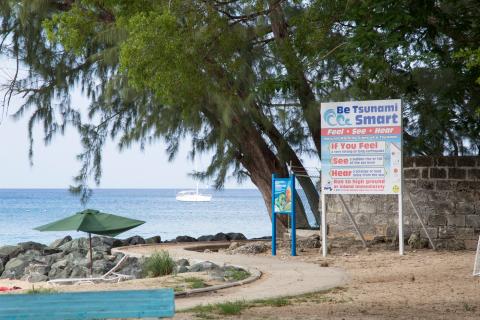
This year, the CARIBE WAVE was held on 11 March to commemorate the 10th anniversary of the Tohoku magnitude-9.0 earthquake, also called the ‘Great Tōhoku Earthquake’, one of the deadliest natural disasters that has ever occurred in Japan. This earthquake caused a tsunami which left 20,000 deaths and led to a major accident at the Fukushima nuclear power station.
The CARIBE WAVE 2021 event has sparked a lot of interest and has already improved the overall tsunami readiness of coastal communities at risk in the Caribbean. Despite the ongoing coronavirus restrictions, the IOC-UNESCO Intergovernmental Coordination Group for Tsunamis and other Coastal Hazards Warning System for the Caribbean and Adjacent Regions decided that the exercise was too important to cancel or postpone. The CARIBE WAVE Task Team ensured that participating countries could plan and safely execute the event according to strict COVID-19 guidelines.
The exercise included two components, namely the receipt of communications from the Pacific Tsunami Warning Center, which provides tsunami information for the region, and an evaluation of the tsunami procedures and programs within countries and territories. Two scenarios were tested, in Jamaica and the Northern Lesser Antilles. The first scenario simulated a tsunami generated by a magnitude 8.0 earthquake located along the Enriquillo-Plantain Garden Fault Zone (EPGFZ); the second scenario was a tsunami generated by a magnitude 8.5 earthquake located Northeast of the Leeward Island.
Despite some initial uncertainty that interest and participation might be affected because of the Covid-19 restrictions, 395,796 individuals registered through the Tsunami Zone website (tsunamizone.org). This was a great turnout with the majority of participants coming from national, state and local governments, followed by organizations in charge of disaster preparedness, and K-12 schools. Non-Profit Organizations, Museums/Libraries/Parks, Volunteer Radio Groups and Media Organizations also participated in record numbers.
Social media has been an extremely effective tool for engagement and increasing awareness about tsunamis. This years’ exercise reached over 2 million people worldwide, clearly demonstrating the interest and importance of CARIBE WAVE for promoting tsunami preparedness in a region assailed by several types of ocean hazards.
For the first time since the CARIBE WAVE exercises began in 2011, a virtual ‘Hot Wash’ was held on 23 March to present initial results from the 11 March exercise and to receive feedback from the Member States.
For further information, please contact:
Alison Brome, Caribbean Tsunami Information Centre (a.brome@unesco.org)
Find out more about CARIBE WAVE: https://www.tsunamizone.org/caribewave/




